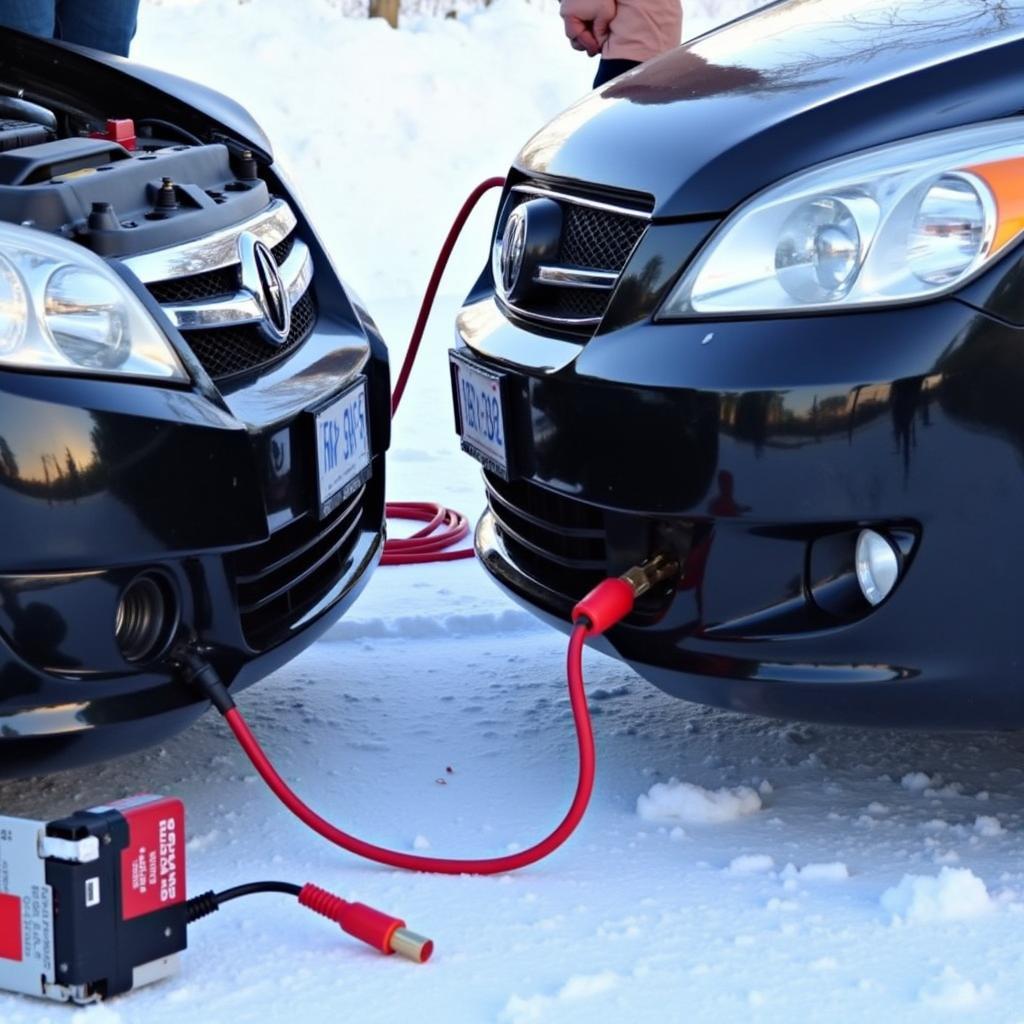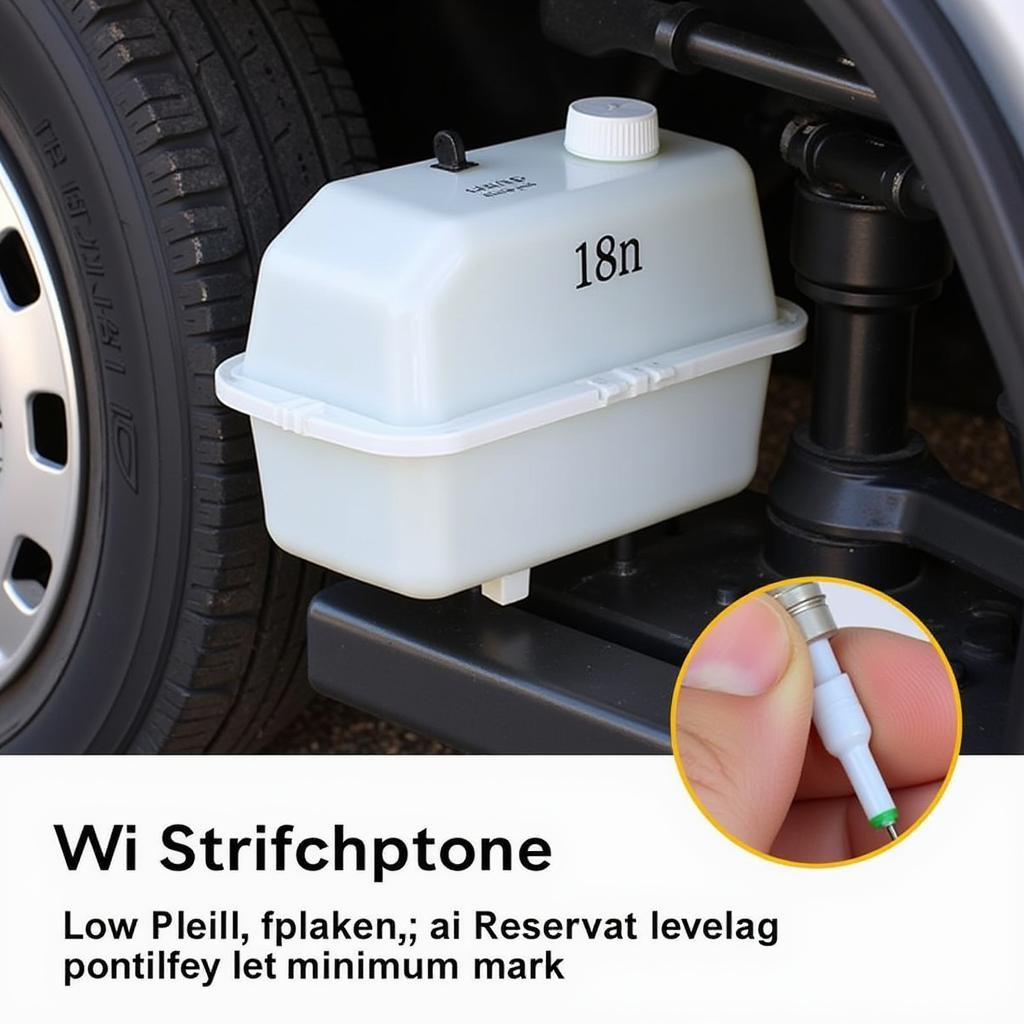Waking up to a dead car battery on a frigid morning is a frustrating experience. “Car battery dies overnight in cold” is a common issue, but understanding why it happens and how to prevent it can save you time, money, and a whole lot of hassle. This article explores the reasons behind this cold-weather car trouble and provides practical solutions to get you back on the road.
Cold temperatures significantly impact a car battery’s performance. Chemical reactions within the battery slow down in the cold, reducing its ability to hold a charge and crank the engine. Think of it like molasses – thick and sluggish in the cold. Moreover, the engine oil thickens, requiring more power from the battery to turn over the engine. This increased demand coupled with the battery’s weakened performance often leads to a dead battery, especially overnight when the car sits idle and the battery loses heat. If your compustar remote start draining battery, this could also be a contributing factor.
Why Does My Car Battery Die Overnight in Cold Weather?
Several factors can contribute to a car battery dying overnight in cold weather. Understanding these can help you identify the root cause and prevent future occurrences.
Low Battery Capacity
As batteries age, their capacity to hold a charge diminishes. Cold temperatures accelerate this decline, making older batteries particularly vulnerable to failing overnight. A simple battery test can determine if your battery’s capacity is sufficient.
Parasitic Drain
Even when the car is off, certain systems, like the clock, radio memory, and security system, draw a small amount of power. This is called parasitic drain. In colder temperatures, this drain can be more impactful on a weakened battery. If you recently changed headlight now car wont start, it might be worth checking for a new parasitic drain.
Faulty Charging System
A malfunctioning alternator or voltage regulator can prevent the battery from charging properly while driving. This leaves the battery vulnerable to dying overnight, especially in cold weather.
Extreme Temperatures
Extremely low temperatures can significantly reduce a battery’s cranking power, making it impossible to start the engine, even if the battery has some charge.
How Can I Prevent My Car Battery From Dying Overnight in the Cold?
Preventing a dead battery is much easier than dealing with the consequences. Here are some preventive measures:
- Test Your Battery Regularly: Have your battery tested at least twice a year, especially before winter arrives.
- Park in a Garage: Whenever possible, park your car in a garage or sheltered area to protect it from the elements.
- Limit Short Trips: Short trips prevent the alternator from fully recharging the battery. Try to combine errands or take longer drives to ensure adequate charging.
- Minimize Accessory Use: Reduce the use of power-hungry accessories like heated seats and defrosters while the engine is idling.
- Clean Battery Terminals: Corrosion on battery terminals can hinder the flow of electricity. Clean them regularly with a wire brush and baking soda solution.
What to Do If Your Car Battery Dies Overnight
If you find yourself with a dead battery, here are a few options:
- Jump Start: Use jumper cables to start your car from another vehicle with a working battery.
- Battery Charger: Use a battery charger to recharge your battery.
- Call for Roadside Assistance: If you’re unable to jump-start or charge the battery, call a roadside assistance service. If you suspect the issue is more complex and your car wont start even with new battery, seek professional help.
 Jump Starting a Car in Winter
Jump Starting a Car in Winter
“In my experience, many winter breakdowns are related to battery issues,” says John Smith, a certified automotive technician. “Regular maintenance and a few preventative measures can significantly reduce the risk of being stranded in the cold.” Another expert, Jane Doe, an electrical engineer specializing in automotive systems, adds, “Cold temperatures put extra strain on the entire electrical system, so ensuring your battery is in top condition is crucial for winter driving.” Consider the tesla battery completely dead scenario and the complexities involved. Prevention is always better than cure. If you’re experiencing problems with a club car onward lithium problems, it’s crucial to address it immediately.
In conclusion, dealing with a car battery that dies overnight in cold weather can be frustrating, but understanding the underlying causes and taking preventive steps can keep you on the road. Regular battery maintenance and mindful driving habits are key to avoiding this common winter woe.
FAQ
- How often should I test my car battery? It’s recommended to test your car battery at least twice a year.
- Can extreme cold damage a car battery? Yes, extremely low temperatures can significantly reduce a battery’s cranking power and lifespan.
- How long does it take to charge a dead car battery? Charging time depends on the battery’s size and the charger’s amperage.
- Is it safe to jump-start a car battery in cold weather? Yes, but ensure you follow proper safety procedures.
- How long does a car battery typically last? Car batteries typically last between 3 and 5 years.
- What are signs of a failing car battery? Slow engine cranking, dim headlights, and clicking sounds when turning the key are common signs.
- How can I minimize parasitic drain on my car battery? Unplug any unnecessary accessories and ensure all lights are turned off when the car is parked.

